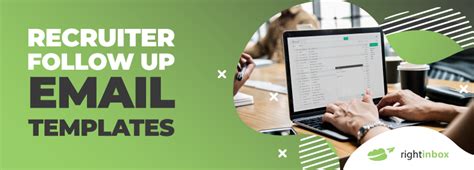The Power of the Perfect Recruiter Follow-Up Email
In today's competitive job market, a well-crafted recruiter follow-up email can be the difference between landing your dream job and getting lost in the applicant black hole. While submitting a stellar resume and cover letter is crucial, the follow-up is where you truly demonstrate your initiative, persistence, and genuine interest. This isn't about being pushy; it's about strategically reminding the recruiter of your qualifications and reinforcing your enthusiasm. This article will delve into the art of crafting the perfect follow-up email, providing you with actionable strategies to increase your chances of success.
Why Follow Up After Submitting Your Application?
Many job seekers overlook the power of a thoughtful follow-up. They assume silence means rejection. However, recruiters are incredibly busy, juggling numerous applications and candidates. A follow-up email isn't a nuisance; it's a reminder that you're serious and engaged. It demonstrates qualities employers highly value: proactive communication, persistence, and strong organizational skills. A well-timed and well-written email can elevate you above the rest.
What Makes a Recruiter Follow-Up Email Effective?
The key to a successful follow-up is personalization and strategic timing. Generic, mass-produced emails rarely cut through the noise. Here’s what makes an effective follow-up email:
-
Personalized Greeting: Avoid generic salutations like "To Whom It May Concern." Research the recruiter's name and use it. A simple "Dear [Recruiter Name]," goes a long way.
-
Relevance to the Job Description: Don't just reiterate your resume. Highlight specific skills or experiences directly relevant to the job description. Show the recruiter how your qualifications directly address their needs.
-
Concise and Professional Tone: Keep it brief and professional. Avoid excessive jargon or overly informal language. Focus on clarity and impact.
-
Value Proposition: Reiterate why you're the ideal candidate, but offer something new. Did you come across a relevant article or industry news that strengthens your case? Mention it.
-
Call to Action: Clearly state your desired outcome. Are you seeking an update on the application process? Are you available for a brief call to discuss your qualifications further? Be clear and direct.
-
Proofreading: This is paramount. Typos and grammatical errors instantly undermine your credibility.
When Should You Send a Follow-Up Email?
Timing is critical. Sending too soon might appear overly eager, while waiting too long risks your application being forgotten. A good rule of thumb is to wait:
-
3-5 business days after applying: If you haven't heard back within this timeframe, a brief follow-up is appropriate.
-
1-2 weeks after an interview: If you've had an interview, a follow-up expressing your continued interest is recommended.
How to Structure Your Perfect Follow-Up Email?
Here's a sample structure you can adapt:
Subject: Following Up - [Your Name] - Application for [Job Title]
Body:
Dear [Recruiter Name],
I hope this email finds you well.
I'm writing to follow up on my application for the [Job Title] position, which I submitted on [Date]. I was particularly excited about [Specific aspect of the job or company that resonates with you].
Since submitting my application, I've [Mention something relevant – e.g., read an article on a relevant topic, attended a conference]. This further solidified my interest in this opportunity, and I’m confident my skills in [Mention 1-2 key skills] would be a valuable asset to your team.
Would you have some time for a brief call sometime next week to discuss my qualifications further? I'm available on [List your availability].
Thank you for your time and consideration.
Sincerely,
[Your Name]
What If You Haven't Heard Back After Multiple Follow-Ups?
If you've sent multiple follow-ups and still haven't received a response, it's likely the position has been filled or your application wasn't selected. While disappointing, it's important to move on and continue your job search.
Addressing Common Concerns:
How many times should I follow up?
Generally, 2-3 follow-ups are sufficient. More than that can come across as pushy.
What if my email is ignored?
This is unfortunately a possibility. It doesn't necessarily mean you're not qualified. Focus on your next opportunity.
Should I use a different method of contacting the recruiter?
Connecting on LinkedIn can be a helpful supplementary approach, but don't use this as a replacement for email follow-ups.
The perfect recruiter follow-up email isn't about manipulation; it's about demonstrating your continued interest and commitment. By employing these strategies and tailoring your message to each opportunity, you can significantly improve your chances of securing your dream job. Remember, persistence, professionalism, and a genuine enthusiasm for the role are key ingredients to success.

